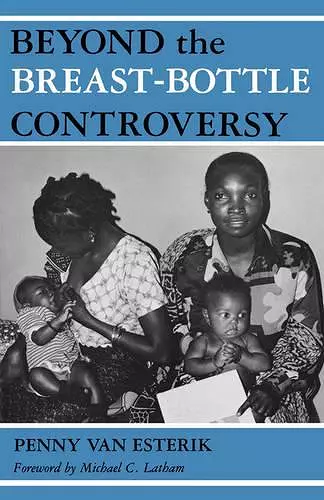Beyond the Breast-Bottle Controversy
Format:Paperback
Publisher:Rutgers University Press
Published:1st May '89
Currently unavailable, and unfortunately no date known when it will be back

"A new milestone in the literature on development. . . . Essential (and enjoyable)reading for a broad range of individuals including all those concerned with urban and rural development . . .; professionals and academics in . . . health, sociology, anthropology, and development economics; many women exploring gender issues and feminism; . . . food industrialists and marketeers; . . . and lastly, ordinary persons interested in how best to nurture babies."
--from the Foreword by Michael C. Latham, Cornell University
Penny Van Esterik takes the reader beyond the Nestle boycott and the activist campaigns against infant-formula manufacturers to the issues underlying the controversy. She shows how the controversy is embedded in the problem of urban poverty, the empowerment of women, the medicalization of infant feeding, and the commoditization of infant foods. She argues that the choice between bottle feeding and breast feeding has significant implications for developing countries. Beyond the Breast-Bottle Controversy raises a host of important questions: why has there been no consistent feminist position? How did infant feeding become medicalized in developing and developed countries? What mechanisms encourage the technology and taste transfer necessary for the expansion of bottle feeding? These questions are examined using documentary sources and interdisciplinary research in Thailand, Indonesia, Kenya, and Columbia.
For Van Esterik, the infant-formula controversy is a valuable case study for understanding the relations between women, the environment, and sustainable development. From this perspective, breast feeding has no long-term negative consequences. It depends on renewable resources, works on the principle that as demand increases so does supply, reduces the dependency of women on consumer products and multinational corporations, and puts pressure on governments to improve the health of mothers. On the other hand, the author argues that bottle feeding has definite long-term negative consequences. Her goal is not to have every woman breast-feed her child, but to create living and working conditions so that every woman can do so if she chooses.
ISBN: 9780813513836
Dimensions: 216mm x 140mm x 20mm
Weight: 340g
268 pages